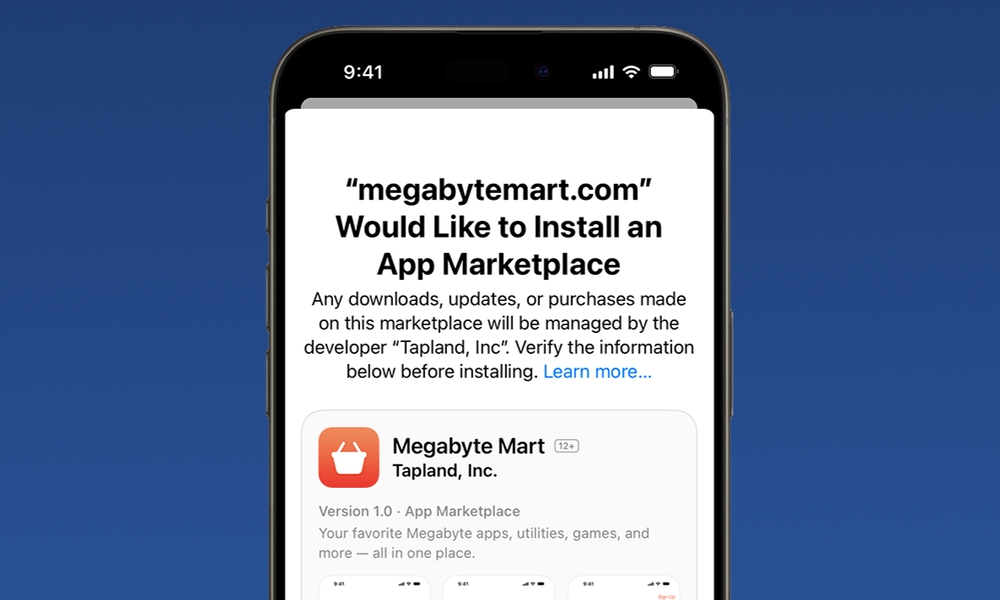Apple Moves One Step Closer to True Sideloading in the EU

Toggle Dark Mode
Earlier this year, Apple announced the most significant changes ever to hit the App Store would be coming to the 27 European Union countries, thanks to the EU’s new Digital Markets Act. However, even though Apple’s move to open up app distribution was unprecedented, many App Store critics felt the company didn’t go far enough.
The wind of change has been blowing in the EU for years, and some iPhone fans had hoped this would lead to true and open sideloading, where users would be able to download and install apps from anywhere, just like you can on a Mac, PC, or even on Android devices. That last platform requires a few extra steps to enable sideloading, but it’s free of any restrictions once you’ve flipped the switch.
Instead, what Apple gave European users was a more tightly controlled version of sideloading where apps could only be downloaded through alternative app marketplaces — third-party app stores that still had to be approved by Apple.
While those alternative app marketplaces had to be downloaded from the developer’s website, individual apps could only be distributed once the appropriate marketplace was installed. Further, Apple placed quite a few restrictions around those marketplaces, including the need to post a million-euro line of credit and prove to Apple that they’d provide good customer service with proper refund policies. They were also required to host more than just their own apps — single-company app marketplaces were prohibited.
As if that wasn’t enough to make things weird for EU users, these new marketplaces are only coming to the iPhone — not the iPad — and will stop working if you venture outside the EU for more than 30 days.
Apple later relaxed the million-euro credit requirement, allowing developers to participate as long as they already have a proven track record on the App Store. Now, it’s taken another step to relax the rules even further.
In a developer announcement today, Apple notes that developers will be permitted to “offer a catalog of apps solely from the developer of the marketplace.” They’ll also be able to design their own promotions, discounts, and other deals when linking out to an external webpage, rather than being forced to use Apple’s design templates.
This means that Epic Games could run its own app marketplace solely to sell Fortnite and its other game titles. Spotify could even run an app marketplace solely to distribute Spotify. However, Apple has announced another even more significant change that will hopefully steer us away from anything quite so silly as downloading an entire app marketplace just to get one or two apps.
Installing Apps Directly From the Web
While alternative app marketplaces will still be entirely possible — and many developers will likely embrace them as a way to sell multiple apps — those that simply want to leave the App Store will now be able to distribute their apps directly from their own websites.
For example, this would allow Spotify to make its iPhone app available as a direct download from its website and turn on in-app purchases without being forced to give Apple a cut.
Web Distribution, available with a software update later this spring, will let authorized developers distribute their iOS apps to EU users directly from a website owned by the developer. Apple will provide authorized developers access to APIs that facilitate the distribution of their apps from the web, integrate with system functionality, back up and restore users’ apps, and more.
While this is a big step closer to full sideloading, there will likely still be a few limitations to contend with. For one, it won’t allow for web-based distribution of whole collections of apps from multiple developers; it’s only for developers to distribute their own iOS apps from their own websites.
Further, Apple still retains at least a basic level of control here. As with alternative app marketplaces, apps distributed directly on a website must be submitted to and notarized by Apple through App Store Connect and can only be distributed from a specific website registered by the developer.
Apps offered through Web Distribution must meet Notarization requirements to protect platform integrity, like all iOS apps, and can only be installed from a website domain that the developer has registered in App Store Connect.
The Notarization process is intended to ensure that apps do what they claim to do in the description, don’t abuse the iPhone’s hardware, and are free of viruses, malware, and obvious scams. However, Apple has made it clear that it won’t be playing nanny here; its stricter censorship rules only apply to Apple’s own App Store, so anything on a website or alternative app marketplace is fair game as long as it doesn’t violate any actual laws.
Lastly, Web Distribution won’t let developers get away without paying Apple anything. The Core Technology Fee (CTF) still applies to Web Distribution just as it does to alternative app marketplaces, which means developers will be paying Apple 0.50 euros for each first annual install over one million in the past 12 months — regardless of whether those first one million installs came from the App Store, an alternative app marketplace, or Web Distribution.
Even though iOS 17.4 has unlocked most of the new App Store changes in Europe, Web Distribution is a new capability that will require another software update coming “later this spring” — likely in iOS 17.5.







